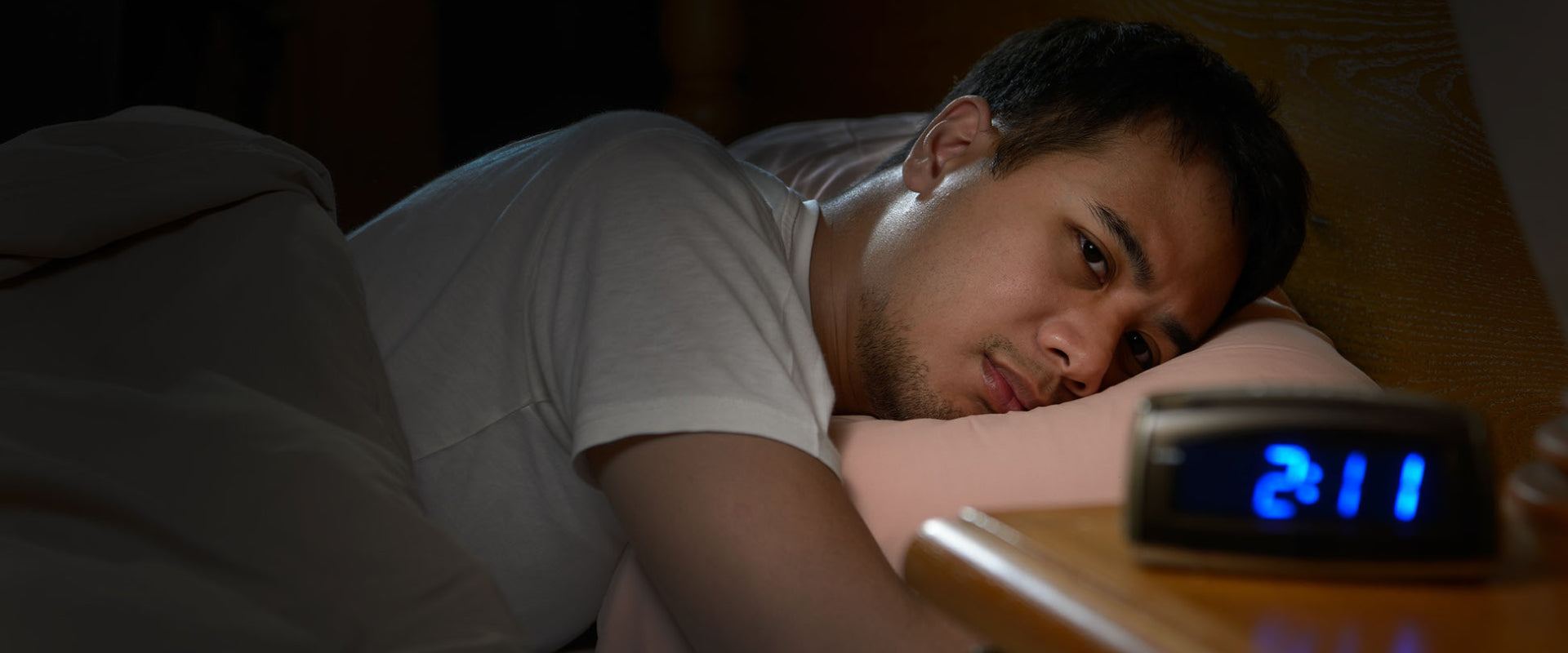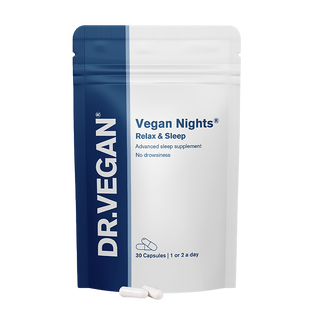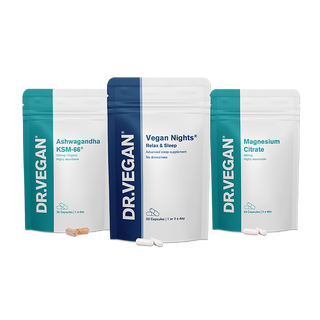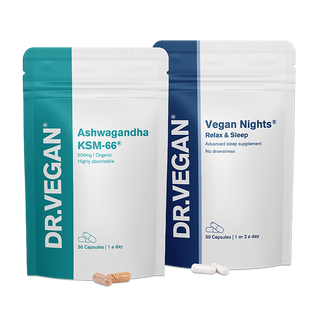How diet impacts your sleep quality

Have you ever noticed that your sleep is more disrupted after eating dinner late in the evening? You may also experience acid reflux after a spicy meal, or become more gassy after eating, in which case you may also enjoy reading 'What your farts say about your health'.
What you eat and the time you eat before bedtime impacts the duration and quality of sleep you have, which in turn impacts on your daily wellbeing.
Importance of sleep
Sleep is essential for the body and mind. According to the Institute of Neurological Disorders, sleep has an impact on “almost every type of tissue and system in the body – from the brain, heart, and lungs to metabolism.”
For the first time, mental health has become a bigger health concern than cancer, according to Ipsos Global Health Service Monitor, and sleep is vital to our mental health. If you suffer poor sleep you're not alone - just 4% of 12,000 people recently surveyed don't experience any issues with sleep. Read the latest sleep insights by DR.VEGAN®.
Maintaining a healthy sleep pattern is vital for the body’s physical and mental performance. Sleep helps support the immune system and improve our mood, concentration, and decision-making, and poor sleep results in major health consequences, including a higher risk of high blood pressure and cardiovascular disease, obesity and diabetes, and anxiety and depression.
You may be interested in reading how to beat jet lag.
Create your free Diet Profile today.
What controls sleep?
A good night's sleep is much more than what time you go to sleep and how much screen time you have before bed. The melatonin and serotonin hormones in the body, work together to help your body fall asleep. The serotonin hormone prompts the body to produce melatonin – the hormone that helps regulate the body’s sleep-wake cycle.
In addition, the circadian rhythm, which is related to the light-dark cycle of the earth, can play a role in sleep. This is the body’s internal 24-hour clock that causes the brain to feel sleepy at night and prompts the body to wake up in the morning. An important factor to consider when thinking about your sleep quality is what you eat. The consumption of different foods and drinks can influence depth of sleep.
How diet impacts sleep
There is a direct relationship between sleep and metabolism. The food we eat influences how the body regulates our circadian rhythm. A change in eating habits, such as skipping breakfast or eating irregularly, has a connection with a poor night's sleep. In simple terms, changes in eating habits re-programs the body to be in ‘another time zone’ than the body’s natural circadian clock, affecting sleep quality. You may be interested in reading 'What is 'social jet lag'?'.
Are eating times important?
A varied diet with sufficient levels of protein, fibre, fat, and carbohydrates, is recommended to avoid disruptive and a shorter night's sleep. However, timing is important. Eating carbohydrate-rich foods in the evenings can delay the body’s circadian rhythm and reduce the secretion of melatonin, the sleep hormone. Similarly, consuming higher levels of protein and fat, or more than one energy drink or drinks with sugar content, can also lead to difficulty in maintaining sleep, resulting in a disruptive night's sleep.
You may like to discover our 'best protein sources on a plant-based diet'.
Consuming a high-GI (glycemic index) meal in the evening can result in feeling sleepier, and the scale of sleepiness is dependent on time. High-GI foods are those that cause a sugary spike. Consuming high-GI foods four hours before sleeping results in feeling sleepier at bedtime in comparison to consuming high-GI foods one hour before sleeping.
How tiredness impacts diet decisions
Poor quality sleep has a circular effect on the body as it in turn results in eating more and worse quality food. This is because sleep impacts psychological health - when the body is tired, decision-making is impaired and this results in poor food choices. Additionally, metabolic processes also play a factor. When you’re deprived of sleep, there is an increased level of hormones that send cues to the body that it’s hungry.
Learn more about the nutrients your body needs for sleep and how the gut and brain are connected.
Can sleep supplements help?
Vegan Nights® is a naturally sourced and plant-based ingredients are expertly formulated so they work in harmony to create the optimal conditions to put your mind and body at rest. Including Griffonia Seed Extract, L-Glycine, L-Theanine, with Magnesium, Zinc and Chamomile.
Vegan Nights®

Two-thirds of customers who take Vegan Nights® find it effective in improving their sleep. 56% enjoy better sleep within 2 weeks, and 80% do so within 4 weeks after they start taking Vegan Nights®.
Foods to eat for better sleep
Choosing the right foods to eat before bed and snacks can make an impact on your sleep quality.
Foods to support better sleep quality
It’s important to understand the body's process to achieve quality sleep. While Serotonin prompts the body to make more Melatonin, the amino acid, Tryptophan, is responsible for increasing Serotonin levels. Therefore, consuming foods high in Tryptophan helps improve sleep quality, we recommend reaching for foods like pumpkin seeds. Additionally, almonds, cashews, pistachios, and walnuts are all unsaturated fats, also known as healthy fats, that support your heart and help to improve Serotonin levels.
Ultimate Sleep Bundle

Spinach, seeds, black beans, avocados, and almonds are rich in Magnesium which supports muscle relaxation and promote sleep.
Some herbs can have a calm and relaxing effect on the body by containing chemicals that help promote sleep and reduce tension. Try adding basil to your next meal, which is also a 'superfood' to support digestion.
Foods to help fall asleep faster and sleep longer
Research suggests eating high-fibre, low-saturated fat meals will result in better quality, “deeper and more restorative sleep”. It’s important to eat healthy, balanced meals as it provides the body with the nutrients it needs to connect with the brain, and release the chemical hormones your body needs to fall asleep.
Kiwis can help improve sleep efficiency (helping you fall asleep faster) and sleep duration. A study found that if two kiwis are consumed an hour before going to sleep, participants fell asleep 14 minutes faster. Additionally, participants slept for 40 minutes longer compared to those who did not consume kiwis.
Studies have also been conducted on the impact of consuming eight ounces of tart cherry juice in the morning, 30 minutes after waking up, and in the evening 30 minutes before dinner, resulted in reduced insomnia, and longer sleep durations. J.Huizen explains, this because “cherries are rich in four different sleep-regulating compounds: Melatonin, Tryptophan, Potassium, and Serotonin.”
We think you'll also enjoy reading 'how your diet can help your sleep' and 'why Vegan Nights® is so good'.
Discover our range of vegan vitamins and supplements.
Want to hear more from our nutritionists? Sign up to our email newsletter for insights and exclusive offers:
References
Afaghi et al. (2007). Available: https://academic.oup.com/ajcn/article/85/2/426/4649589?login=falseBinks et al. (2020). Available: https://www.mdpi.com/2072-6643/12/4/936
Birks et al. (2013). Available: https://pubmed.ncbi.nlm.nih.gov/23910656/
Cleveland Clinic (2022). Available: https://health.clevelandclinic.org/foods-that-help-you-sleep/
Heid (2020). Available: https://www.everydayhealth.com/sleep/how-what-you-eat-affects-how-you-sleep/
Huizen (2019). Available: https://www.medicalnewstoday.com/articles/324295#_noHeaderPrefixedContent
Lin et al. (2011). Available: https://apjcn.nhri.org.tw/server/APJCN/20/2/169.pdf
Meyer (2021). Available: https://foodinsight.org/does-your-diet-affect-your-sleep/
NIH. Available: https://www.ninds.nih.gov/health-information/public-education/brain-basics/brain-basics-understanding-sleep
Roberts et al. (2016). Available: https://jcsm.aasm.org/doi/10.5664/jcsm.5384#d3e531
St-Onge et al. (2016). Available: https://www.sciencedirect.com/science/article/pii/S2161831322007803?via%3Dihub
DiGiulio (2017). Available: https://www.nbcnews.com/better/health/how-what-you-eat-affects-how-you-sleep-ncna805256



















